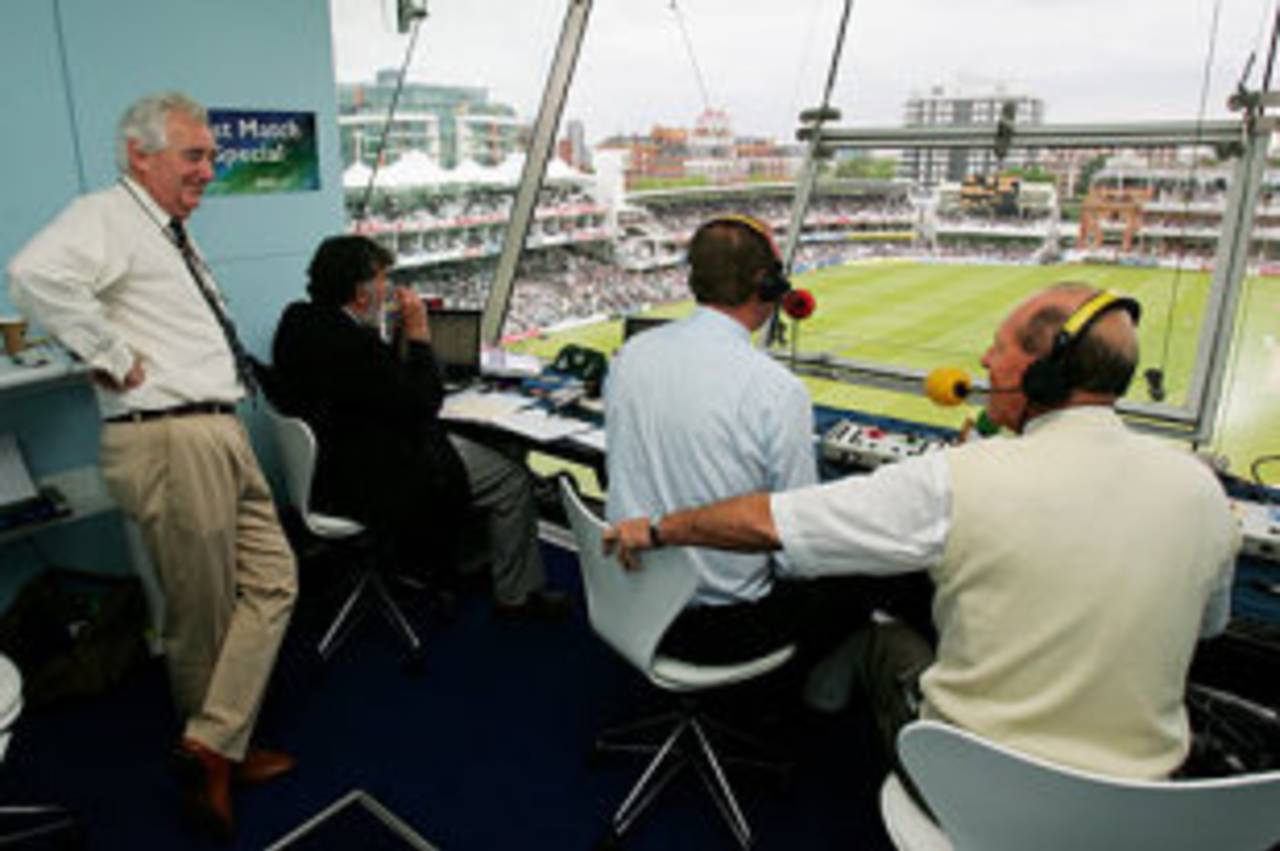Cricket Sightings: A Sonic Cricket Encounter
The US-based cricket fan reacts with an emotion that is a mix of pleasure, relief, and sometimes, a giddy determination to make the most of it
Samir Chopra
25-Feb-2013

BBC Test Match Special team at Lord's • Getty Images
A cricket fan that lives in the US is used to a very particular estrangement from the game: the inaccessibility of the game on television and broadcast media; an absence of cricket scores and reports in newspapers; the inability to play a game of cricket on a proper cricket pitch; the lack of a community of fellow fans. Cricket is often the invisible sport, the game that dare not speak its name.
So when cricket makes an appearance, the US-based cricket fan reacts with an emotion that is a curious mix of pleasure, relief, and sometimes, a giddy determination to make the most of it. These reactions can be occasioned by many prompts: rare access to a live televised game, a snippet of a cricket score that miraculously found its way into the back pages of a local newspaper (perhaps thanks to a diligent, cosmopolitan, sports reporter), an impromptu game thrown together by a few enthusiasts, and of course, most pleasurably, the chance to watch a game in the company of other aficionados. In the twenty-five years I have lived in the US, I have sampled some of these pleasures; they have served to provide me some of the most pleasant memories of my time here.
Sometimes a 'cricket sighting' needn't be so direct. It may be a mere reference to the game in a non-cricketing context. On my old cricket blog, Eye on Cricket, I had started to put together a collection of references to cricket in philosophy texts; these were invariably, made by English or Australian philosophers, and used to illustrate a broader philosophical point. The first one I encountered was in JL Austin's work on speech acts: how a spoken sentence or word can be an action. The example: a cricket umpire saying 'Out.' And so on.
Sometimes, the cricket connection could be especially indirect, and yet especially pleasurable. My fondest memory of one such encounter dates back some twenty-one years and took place at a live music concert. Like many of those who grew up watching cricket highlights in the 1970s, I had come to associate a particularly bouncy, funky tune with the titles section of the BBC Test Cricket highlights reel. I didn't know who the artist was or the name of the track. All I knew was that it heralded thirty minutes of bliss; as it faded out, the commentator's voice would fade in, and we would be off to the game. Without exaggeration, that track was the definitive soundtrack for the cricket of the seventies. But that's all I knew about it.
In 1991, I had been living in New Jersey for four years, and among my many diversions, counted attendance at live music concerts. I stood in line for hours to buy tickets; rigged up automated dialers to call Ticketmaster when a hot act went on sale; and sometimes spent all my savings on traveling to distant towns to watch my favorite bands. That summer, I learned of the Squaw Valley Music Festival, due to be held at the Squaw Valley Ski Resort, close to Lake Tahoe. It sounded like heaven: two days of music, featuring eight bands, high up on the ski slopes, surrounded by beautiful pine forests. What was not to like? I had to go. I had little money, but I did have a voucher for a cheap flight, and besides if I rented a car, I could just sleep in the backseat and avoid paying for a hotel.
I duly purchased my discounted flight tickets, flew into Sacramento, rented a car, drove to Reno, Nevada, spent the night sleeping in my car in a casino parking lot, and then the next day, drove back to Squaw Valley for the show. The first day's live performances, were, as they promised to be, suitably epic, and after spending another night sleeping in my car (this time in a 7-11 parking lot), I looked forward to the next day's show.
The second day's acts included Booker T and the MGs; I had never seen them live before, and only knew one of their songs: Green Onions. Booker and his crew were still tight after all those years and they soon had the crowd on their feet. Northern California had never seemed so good.
And then, it happened. A few songs into their set, Booker leaned over to the mike, said, "This next one is called Soul Limbo" and the band kicked off. At that moment, I learned the identity of the BBC Test Cricket Highlights title track.
On that beautiful summer afternoon, a few thousand of us long-haired, tie-dye-wearing types stood swaying to the sounds of a sixties R&B band. Among that crowd, one audience member, his eyes closed, had been transported to venues and visions considerably distinct, thinking of men in whites on cricket fields far away.
Samir Chopra lives in Brooklyn and teaches Philosophy at the City University of New York. He tweets here